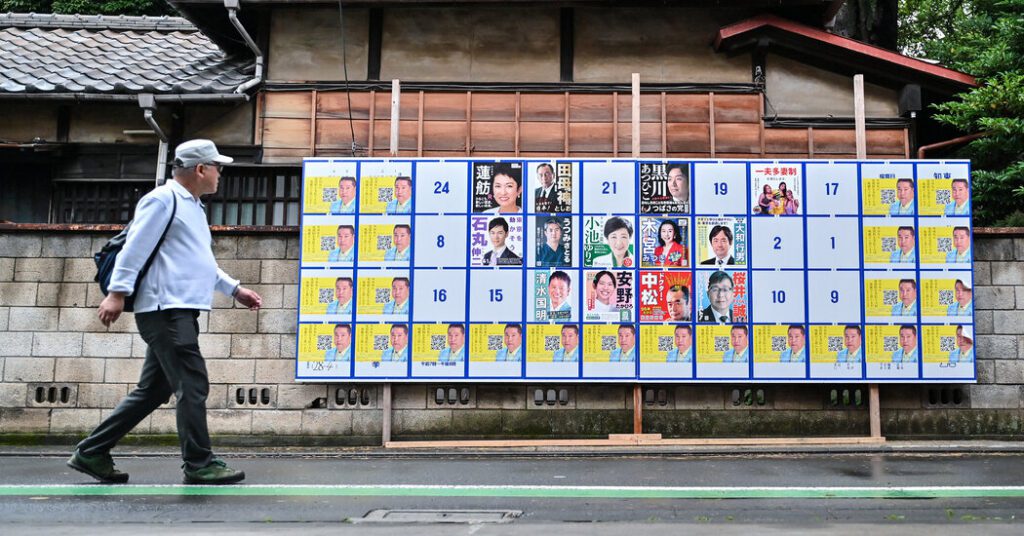When voters in Tokyo solid their poll for governor of the world’s largest metropolis on Sunday, they are going to be spoiled for alternative.
Fifty-six candidates are contending for the workplace, a document. One who types himself “the Joker” has proposed legalizing marijuana and says polygamy can tackle the nation’s declining birthrate. One other is a professional wrestler who hides his face on digicam and vows to make use of synthetic intelligence to finish governmental duties. There’s a 96-year-old inventor who says he’ll deploy gas-fueled automobiles that don’t emit carbon, and a 31-year-old entrepreneur who took off her shirt throughout a marketing campaign video and promised “enjoyable issues.”
It’d appear like democracy run amok. However in actual fact, the race is profoundly establishment and the incumbent is projected to win a 3rd time period.
The proliferation of candidates displays fatigue with politics as ordinary, and lots of of them are unserious consideration seekers, making a farcical, circuslike environment and placing actual change additional out of attain.
“I’m wondering if that is democracy in motion, or whether or not it’s like an ‘up yours’ to democracy,” mentioned Emma Dalton, a senior lecturer in Japanese Research at La Trobe College in Melbourne, Australia. A number of candidates have criticized the incumbent, Yuriko Koike, “in probably the most vulgar manner,” mentioned Ms. Dalton. “As a result of they know she’s going to win.”
The Tokyo election is emblematic of Japanese politics, the place on the nationwide degree the Liberal Democratic Social gathering has ruled for all however 4 years since 1955. The occasion, which is backing Ms. Koike, has held an iron grip on Japan’s Parliament, regardless of quite a few scandals and widespread voter dissatisfaction that’s expressed in polls however not often on the poll field.
Ms. Koike, 71, has been dogged by questions on her college credentials and has refused to handle accusations that she is linked to a big actual property developer concerned in a number of controversial tasks. However simply because the Liberal Democrats keep in energy regardless of low approval rankings, she could also be benefiting from a sense that there isn’t a must upset the apple cart at a time of relative prosperity.
Regardless of some widening inequality and pockets of poverty, “most middle-class residents are happy with their lives in Tokyo,” mentioned Jiro Yamaguchi, a political scientist at Hosei College in Tokyo.
Though Ms. Koike has not completely delivered on guarantees to remove day care ready lists, cut back commuter prepare congestion and abolish extra time amongst municipal employees, she has used a funds surplus to supply subsidies for households with kids and free tuition to non-public excessive colleges within the metropolis.
Ms. Koike didn’t grant an interview request. Mitsui Fudosan, the developer concerned within the constructing tasks, mentioned in an e-mail that it had “no shut relationship” with the governor and had not “been offered any particular favors.”
At first, the Tokyo governor’s race appeared to vow a referendum on the Liberal Democratic Social gathering, when one critical challenger emerged to oppose Ms. Koike: Renho Saito, 56, a former chief of Japan’s largest opposition occasion, who stepped down from her parliamentary seat to run. However the lineup of so many candidates has distracted from her marketing campaign.
As the primary girl to steer the opposition Democratic Social gathering, Ms. Saito is well-known in Japan. She has sought to differentiate herself from Ms. Koike by emphasizing the necessity to increase wages for younger employees and to rein in authorities spending. However she has additionally criticized the nationwide occasion for monetary scandals which have little to do with the Tokyo governorship.
Specializing in the nationwide occasion is “a simple cudgel,” mentioned Kenneth McElwain, a political scientist on the College of Tokyo. The hazard is that “it’s a cause to not vote for Koike, but it surely’s additionally a cause to vote for any of the 50-odd challengers.”
Different candidates have taken swings on the nationwide authorities. Yusuke Kawai, who appeared in a marketing campaign video on NHK, the general public broadcaster, with stringy hair, face whitened and lips smeared crimson in a caricature of the Joker from the Batman franchise, lambasted Prime Minister Fumio Kishida for his plans to lift taxes.
“Prime Minister, earlier than you increase taxes, be sure to promote that Rolex in your wrist!” he screeched, cackling maniacally and writhing on a desk.
Marketing campaign guidelines enable anybody who pays a deposit of about $19,000 to run for governor, and provides every candidate two six-minute slots on NHK and the correct to publish indicators on one in all 14,000 official election billboards throughout the town.
Though the intent is to degree the enjoying subject for political participation, the system has been hijacked by individuals who need to attain a big viewers with messages which may have little to do with politics.
Throughout a marketing campaign broadcast on NHK, Airi Uchino, the younger entrepreneur, eliminated a striped, button-down shirt to disclose her cleavage in a cream-colored tube high. “I’m not simply cute,” she purred, inviting potential voters to attach together with her on Line, Japan’s fashionable messaging app. “I’m horny, proper?”
Ms. Uchino is backed by the Social gathering to Defend the Folks from NHK, a renegade group that’s supporting near half of these operating for governor. The group has permitted its candidates and a few others to publish marketing campaign posters that includes pictures of cats or cartoon animals on the official election signboards.
Some candidates have used airtime to advance normal opinions, corresponding to opposing welfare advantages for overseas employees in Japan or transgender rights.
The sheer quantity of candidates can muffle critical opposition. With all paid promoting banned, mentioned Jeffrey J. Corridor, a lecturer in politics at Kanda College of Worldwide Research, “mainstream candidates can’t amplify their messages to the purpose the place they drown out the voices of the minor candidates.”
The disruption is obvious. In polling, Ms. Saito seems to be battling for second place with Shinji Ishimaru, 41, a former mayor of a metropolis in Hiroshima Prefecture who described himself as an “idol” to supporters at a rally final week.
Mr. Ishimaru has not supplied a lot of a platform, however his reputation on TikTok and YouTube has helped him win help from youthful voters.
Such candidates symbolize Japan’s breed of populism, mentioned Koichi Nakano, a political scientist at Sophia College in Tokyo, including that lots of the “frivolous
candidates” don’t anticipate to win.
“This can be a day the place notoriety is enterprise,” Mr. Nakano mentioned. “Having fame of any form goes to result in extra enterprise alternatives.”
As somebody attempting to steer a critical problem, Ms. Saito faces voters pushed much less by help for her than by their lack of curiosity within the present governor.
Yumi Matsushita, a college lecturer attending one in all Ms. Saito’s rallies in Chofu, mentioned she didn’t like that Ms. Koike “doesn’t respect” the voices of these from different ethnicities or L.G.B.T.Q. folks.
However her actual objection to Ms. Koike was that “a 3rd time period is just too lengthy.”
Because the incumbent, Ms. Koike maintains a big benefit: No earlier occupant of the workplace has misplaced an election. She has additionally benefited from a largely compliant information media. Although it has dug into rumors that she misrepresented her commencement from Cairo College, it has not investigated allegations that she has favored Mitsui Fudosan, the developer, in building contracts.
One attainable cause: Two of the nation’s largest newspapers, the Yomiuri Shimbun and Asahi Shimbun, are investing in a type of constructing tasks.
River Davis and Hisako Ueno contributed reporting from Tokyo.



